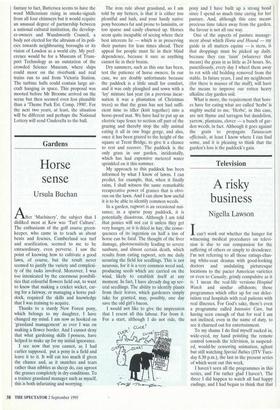Gardens
Horse sense
Ursula Buchan
After 'Machinery', the subject that I disliked most at Kew was 'Turf Culture'. The enthusiasm of the golf course green- keeper, who came in to teach us about bents and fescues, Cumberland sea turf and scarification, seemed to me to be extraordinary, even perverse. I saw the point of knowing how to cultivate a good lawn, of course, but the result never seemed to justify the variety and complexi- ty of the tasks involved. Moreover, I was too intoxicated by the enormous possibili- ties that colourful flowers held out, to want to know that making a cricket wicket, car- ing for a fairway, or managing a horse pad- dock, required the skills and knowledge that I was training to acquire.
Thanks to a sturdy New Forest pony, which belongs to my daughter, I have changed my mind. I am now as hooked on 'grassland management' as ever I was on making a flower border. And I cannot deny that what gardening skills I possess, have helped to make up for my initial ignorance.
I see now that you cannot, as I had earlier supposed, put a pony in a field and leave it to it. It will eat too much if given the chance and, as it snatches and tears rather than nibbles as sheep do, can uproot the grasses completely in dry conditions. To a trainee grassland manager such as myself, this is both infuriating and worrying. The iron rule about grassland, so I am told by my betters, is that it is either too plentiful and lush, and your hardy native pony becomes fat and prone to laminitis, or too sparse and easily churned up. Horses seem quite incapable of seeing where their best interests lie — which is in preserving their pasture for lean times ahead. Their appeal for people must lie in their blind dependence, because it sure as anything cannot lie in their brains.
Dry summers, such as this one has been, test the patience of horse owners. In our case, we are doubly unfortunate because the paddock is a little small for comfort, and it was only ploughed and sown with a 'ley' mixture last year (in a previous incar- nation it was a plantation of Christmas trees) so that the grass has not had suffi- cient time to tiller (knit together) into a horse-proof mat. We have had to put up an electric tape fence to section off part of the grazing and thereby stop the silly animal eating it all in one huge gorge, and also, once it has been grazed to the height of the square at Trent Bridge, to give it a chance to rest and recover. The paddock is the only grass in our garden, incidentally, which has had expensive metered water sprinkled on it this summer.
My approach to this paddock has been informed by what I know of lawns. I can predict, for example, that, when it finally rains, I shall witness the same remarkable recuperative power of grasses that is obvi- ous on the lawn. And I can show how useful it is to be able to identify common weeds.
In a garden, ragwort is an occasional nui- sance; in a sparse pony paddock, it is potentially disastrous. Although I am told that ponies will not eat it unless they get very hungry, or it is dried in hay, the conse- quences of its ingestion on half a ton of horse can be fatal. The thought of the liver damage, photosensitivity leading to severe sunburn, and almost certain death, which results from eating ragwort, sets me daily scouring the field for seedlings. This is not neurosis, for it is a very common weed and, producing seeds which are carried on the wind, likely to establish itself at any moment. In fact, I have already dug up sev- eral seedlings. The ability to identify plants from their leaves, which gardeners simply take for granted, may, possibly, one day save the old girl's bacon.
I would not like to give the impression that I resent all this labour. Far from it. For a start, although I do not ride, the pony and I have built up a strong bond since I spend so much time caring for her pasture. And, although this care means precious time taken away from the garden, the favour is not all one way.
One of the aspects of pasture manage- ment about which Horse and Hound — my guide in all matters equine — is stern, is that droppings must be picked up daily, because they can 'taint' (whatever that means) the grass in as little as 24 hours. So, punctiliously, every day I wheel them away to rot with old bedding removed from the stable. In future years, I and my neighbours (for there is masses of the stuff), will have the means to improve our rotten heavy alkaline clay garden soil.
What is more, the requirement that hors- es have for eating what are called 'herbs' is mighty useful to me. 'Herbs', in this case, are not thyme and tarragon but dandelion, yarrow, plantains, clover — a bunch of gar- den weeds, in fact. Although it goes against the grain to propagate Taraxacum officinale, at least I know where I can find some, and it is pleasing to think that the garden's loss is the paddock's gain.


















































 Previous page
Previous page